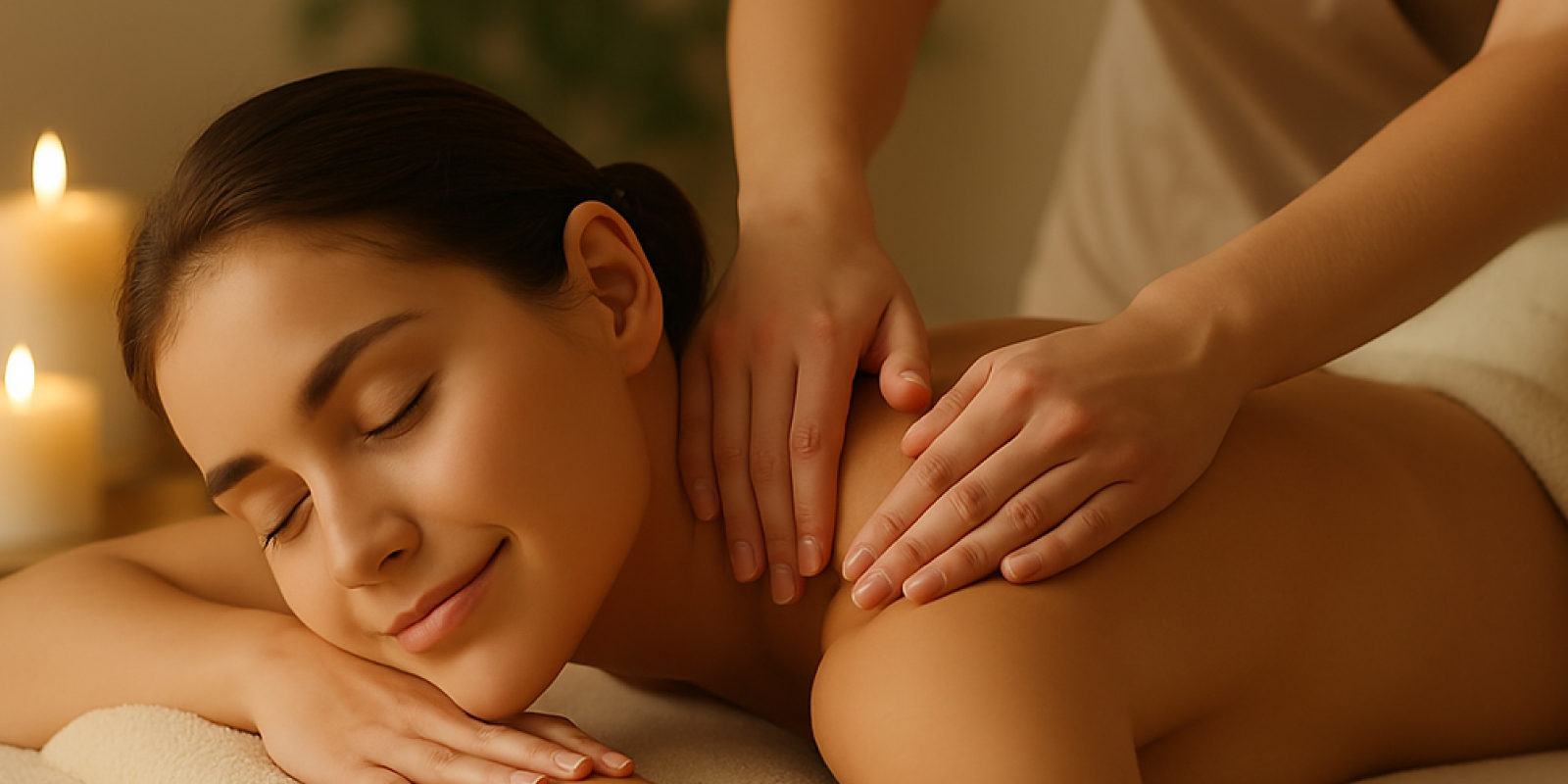Introduction: Say Hello to Stillness in a Noisy World
In a world where your to-do list feels endless and rest seems indulgent, stress has quietly become the background hum of modern life. Maybe you feel it as jaw tension, tight shoulders, or a racing mind that refuses to slow down.
But your body has a message—it’s asking for stillness.
Relaxation massage offers more than just fleeting comfort. It provides a moment of reconnection—a time for your nervous system to soften, your breath to deepen, and your body to remember what it feels like to be at peace.
This article is your invitation to reclaim calm. Learn how gentle massage techniques can melt away tension, clear mental fog, and create a lasting sense of balance—right from the comfort of your home or a professional wellness space.
Want to begin your wellness journey? Scroll down to download your free guide: Relaxation Massage Techniques: The Art of Stress Relief and Nervous System Calming.
What Is Relaxation Massage?
Relaxation massage is a gentle, flowing bodywork technique designed to soothe your entire system—not just your muscles, but your mind and emotions as well. It’s grounded in the principle that rhythmic touch can help return the body to its natural state of calm and healing.
The Philosophy Behind It
Unlike deep tissue or sports massage, this style isn’t about breaking through muscle knots. It’s about presence over pressure. Long, slow strokes encourage your body to let go, allowing tension to dissolve naturally.
As you relax:
- Breathing deepens
- Heart rate slows
- Cortisol (your stress hormone) drops
- Feel-good chemicals like serotonin rise
Relaxation massage reconnects you to the sense of peace that gets buried beneath daily chaos.
The Science of Stress & the Nervous System
Resetting Your Inner Balance
Your nervous system operates in two modes:
- Sympathetic (fight-or-flight): Constant alertness, stress, reactivity
- Parasympathetic (rest-and-digest): Recovery, healing, balance
Most of us live in sympathetic overdrive. But massage gently activates the parasympathetic response, allowing your body to:
- Decrease cortisol
- Promote rest, recovery, and emotional regulation
- Increase dopamine and serotonin
Massage is one of the few touch-based therapies that can directly shift your nervous system into healing mode.
People Also Ask
Q: How does massage ease mental stress?
A: By stimulating the vagus nerve and lowering cortisol, massage calms your nervous system and helps you feel more grounded.
Q: How does cortisol impact sleep?
A: Elevated cortisol disrupts your sleep cycle. Regular massage reduces cortisol, promoting deeper and more restful sleep.
Popular Relaxation Massage Techniques
Different methods support different needs. Here are four relaxing massage styles to explore:
- Swedish Relaxation Massage
- Uses long gliding strokes, light kneading, and gentle circular motions. Promotes circulation and deep relaxation—perfect for full-body stress relief.
- Aromatherapy Massage
- Combines massage with essential oils. Lavender reduces anxiety, eucalyptus helps open the breath, and bergamot uplifts mood.
- Neck, Shoulder & Head Massage
- Ideal for digital fatigue and emotional tension. Releases tightness in the jaw, temples, scalp, and traps.
- Reflexology for Relaxation
- Gentle foot massage based on reflex points. Can ease anxiety, improve digestion, and calm the entire body.
How to Maximize Your Relaxation Experience
Self-Care Rituals to Support Your Massage
- Before your session: Hydrate, avoid caffeine, and mentally prepare to relax
- After your session: Rest, reflect, and integrate the calm into your day
Set the Mood at Home
Dim the lights, play soft music, use calming scents (lavender, chamomile, sandalwood). Even a short self-massage becomes powerful in the right environment.
Blend Massage with Mindfulness
- Add breathwork or a guided meditation
- Journal after your massage to track emotional shifts
- Use massage as a time to reconnect with your body
When to See a Professional Massage Therapist
Sometimes, your own hands can only reach so far.
Signs You Could Benefit From a Pro:
- You’re dealing with chronic stress or insomnia
- You carry persistent tension in your neck, jaw, or shoulders
- You feel emotionally overwhelmed or mentally burnt out
How to Choose the Right Practitioner
Look for professionals trained in:
- Swedish Massage
- Aromatherapy Massage
- Reflexology
Be sure to communicate your needs clearly and choose someone who makes you feel safe and heard.
What to Expect in a Session
Expect a peaceful, nurturing experience with no pressure to talk or perform. The goal is simple: to receive and let go.
Frequently Asked Questions – FAQs
Q: What is relaxation massage and how does it work?
A: Relaxation massage is a gentle technique using long, flowing strokes to soothe the body and mind. It helps reduce stress, lower cortisol levels, and trigger the nervous system’s natural rest-and-heal response.
Q: How does relaxation massage help with stress relief?
A: It stimulates the vagus nerve, lowers cortisol, and boosts feel-good chemicals like serotonin—helping you feel calmer, clearer, and more emotionally balanced.
Q: Can massage help me sleep better?
A: Yes. Relaxation massage calms your nervous system and lowers stress hormones, making it easier to fall asleep and stay asleep longer.
Q: What type of massage is best for relaxation?
A: Swedish massage, aromatherapy massage, and gentle reflexology are all excellent for full-body relaxation and emotional reset.
Q: How often should I get a relaxation massage?
A: For ongoing stress relief or sleep support, weekly or bi-weekly sessions are ideal. Monthly sessions are great for general wellness maintenance.
Q: What should I do before and after a relaxation massage?
A: Before: Stay hydrated and avoid caffeine. After: Rest, drink water, and reflect on how your body feels to prolong the calming effects.
Q: Can I do a relaxation massage at home?
A: Absolutely. Use calming oils, soft lighting, and mindful techniques like slow strokes and breathwork to recreate a spa-like experience at home.
Q: What are signs I should see a professional massage therapist?
A: If you’re dealing with persistent stress, sleep issues, or emotional overwhelm, a trained therapist can guide you through deeper healing.
Q: How does massage help the nervous system reset?
A: It shifts the body from the fight-or-flight state into the rest-and-digest mode, helping regulate emotions, improve digestion, and calm the mind.
Q: Can relaxation massage be combined with mindfulness or meditation?
A: Yes. Adding breathwork, guided meditations, or journaling can deepen your relaxation and create a powerful stress relief ritual.
Download the Relaxation Massage Techniques Guide
Your body is designed to relax—you just need to give it the right conditions.
Our free guide, Relaxation Massage Techniques: The Art of Stress Relief and Nervous System Calming, walks you step-by-step through simple rituals and massage styles that reset your system from the inside out.
Inside, You’ll Discover:
- An overview of calming massage techniques
- Daily wellness rituals to support nervous system health
- At-home techniques, journaling prompts, and emotional resets
A self-care planner to help you build consistency
Ready to invite more calm, clarity, and presence into your life?
👉 [Download the Relaxation Massage Techniques Guide: The Art of Stress Relief and Nervous System Calming]

